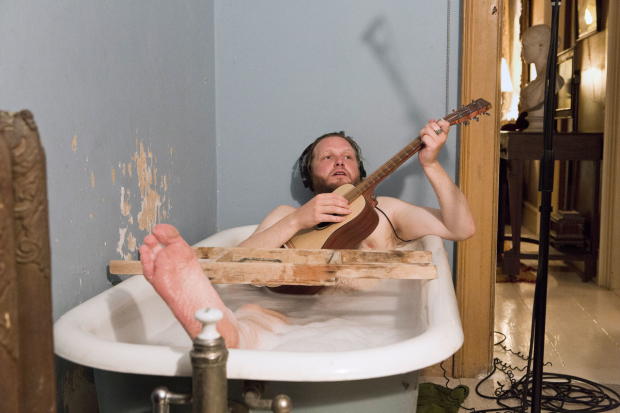Matt Trueman: Is music the most powerful thing in theatre?

© Elisabet Davidsdottir/Courtesy of the artist, Luhring Augustine, New York and i8 Gallery, Reykjavík
Almost a month on, I’m still listening to Ragnar Kjartansson’s track "The Visitors". It accompanies the washing up. It’s in the background while I write. Sometimes, it’s a Sunday morning in bed – before Cerys Matthews kicks in on Radio 6 Music, obviously. What was an hour in a dark room at the Barbican as part of his performance art show, has bled into my life in a bigger way than I could have expected. It has become the soundtrack of September.
It might have made for a melancholic month. Kjartansson created "The Visitors" in the wake of his divorce. (The title comes from ABBA’s last studio album.) He scattered a group of musicians through Rokeby Farm, a dilapidated estate in upstate New York; one in each room, alone on camera. In the video installation, you watch as Kjartansson himself sits in the bath, guitar on his chest, toes poking out of the water. An accordionist sits by an open window. One of Sigur Ros is downstairs on the grand piano, smoking cigars and sipping whisky.
In many shows I see, music ends up doing most of the work
And they play. Alone. Together. Filling this house with music: a song that gains in confidence until it crescendos. The lyrics, pinched from his ex-wife’s poems, repeat over and over. "There are stars / exploding / around you," Kjartansson hollers, head back in the tub, "And there’s nothing / you can do." A thin, reedy start surges into this shouted sing-a-long. It is, by turns, self-pitying, resentful and, in the end, joyous. One big, lung-busting bellow at the entire universe.
Music’s never really done much for me – at least, not on its own. I’ve a tin ear and little sense of how to read its workings. In performance, however, all that changes. In many shows I see, music ends up doing most of the work.
In fact, most of my strongest theatre memories are musical. Songs are the madeleines of the stage. Eight years on – eight years – and Explosions In the Sky’s "First Breath After Coma" can take me right back to Ontroerend Goed’s Once and For All… at the Traverse; its teenagers repeating every action double-size – quadbikes for pushcars, water coolers for plastic cups. It was a glorious upping of the ante, and whenever that song drops – it’s tight-wound guitar suddenly giving way – it carries the same feeling of freedom that I felt in Trav 2; the same sense that anything is possible, that life is simply for living.
I can’t listen to Marina and the Diamonds "I Am Not a Robot" or Arcade Fire’s "Rebellion (Lies)" without going straight back to Earthquakes in London at the National Theatre. "Big Big Love" by Foals is A Series of Increasingly Impossible Acts by Secret Theatre, all the fizzing energy and sweat bursts of that show. Goran Bregovic’s "Kalashnikov" is the fury of Near Gone; Daniel Johnson’s "True Love Will Find You In the End" is the yearning ache of Sam Gold’s Glass Menagerie.
I can’t listen to Arcade Fire’s "Rebellion (Lies)" without going straight back to Earthquakes in London
Years later, these songs are shortcuts to those shows and the emotions they carried. They have been corrupted, distorted, repackaged; forever tied to a specific feeling their composers never intended. As someone who thinks visually, who reads images rather than sounds, it’s the combination that works for me: not a song on its own, but music tied to a moment.
Maybe that’s why it’s such a powerful thing in theatre – and, interviewing Tom Morris the other week he described is as "the most powerful tool in theatre-making." Music marks a moment; stains it somehow. In a live, ephemeral medium, such as theatre, it imprints itself into memory. You’ll hear it said time and again: music bypasses the rational brain. It goes to work directly on our emotions, on our bodies. The right song at the right point in the right show ups the intensity. It’s as if it brands us, burns a set of feelings that might otherwise fade away into our very being. And it only takes a couple of notes, a snatch of that song, to bring it all back.
That’s why Ragnar Kjartansson’s on repeat in my flat – not because "The Visitors" is great music, but because it takes me straight back to the Barbican and the feelings it triggered first time around: sadness followed by a soaring heart. In music, the past lingers on into the present. Theatre echoes on through song.










